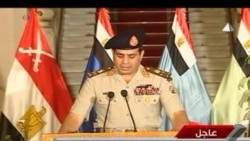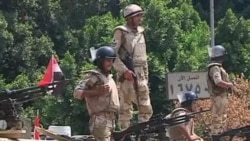STATE DEPARTMENT —
The United States is suspending the delivery of major weapons to Egypt over delays in progress toward an inclusive government. The decision follows the ouster of the country's first democratically-elected leader.
The Obama administration says it is holding back the delivery of hundreds of millions of dollars' worth of jets, tanks, missiles, and attack helicopters, pending what a U.S. statement calls "credible progress toward an inclusive, democratically elected civilian government through free and fair elections."
Following a review of events since the military toppled President Mohamed Morsi in July, President Barack Obama has also decided to suspend $260 million in assistance to the interim government that followed that coup.
A senior U.S. official says suspending these programs may not lead directly to greater democracy or a more inclusive government in Egypt, but it makes clear that "the United States will not support actions that run contrary to our interests and our principles."
President Obama has said there can be no business as usual following the ouster of President Morsi, and a senior administration official says this suspension is a way of expressing that point.
WATCH: Related video from VOA's Zlatica Hoke
But it is far from a complete break in U.S. assistance. Washington will continue to support programs that it says directly benefit the Egyptian people, such as health, education, and private sector development.
The United States also will continue to fund programs that advance what it calls "vital security objectives," including counterterrorism, counterproliferation, border security, peace with Israel, security in the Sinai Peninsula, military training, and spare parts for U.S.-manufactured military equipment.
Congressional Quarterly senior editor Jonathan Broder says President Obama has chosen the middle ground, under pressure from those critical of his not taking a harder line against Egypt's military for toppling President Morsi.
"There is the image that President Obama wants to present to the world as someone who stands up for human rights and for democracy. And the images of Egyptian soldiers killing protesters on the streets of Cairo is a very negative one in the United States, and there’s pressure on him from human rights organizations and from some in Congress to suspend the aid," said Broder.
A senior administration official says U.S. Defense Secretary Chuck Hagel discussed the move in a 40-minute telephone call with Egyptian Defense Minister General Abdel-Fattah al-Sisi Wednesday, in which they reaffirmed the importance of the U.S.-Egyptian relationship in maintaining stability in the broader Middle East.
In an interview with Alhurra television, Broder said al-Sisi is key to easing U.S. concerns about Egypt's way forward.
"I think that there is a much better chance of the United States being convinced that the current interim government in Egypt is legitimate if two things happen. One is if General al-Sisi moves the country toward fair and free elections. And number two, and very importantly, if the violence, if the level of violence goes down," he said.
In its written statement, the Obama administration says it wants to see Egypt succeed and believes its partnership will be strongest when Egypt is represented by an inclusive, democratically elected civilian government based on the rule of law, fundamental freedoms and an open and competitive economy.
The Obama administration says it is holding back the delivery of hundreds of millions of dollars' worth of jets, tanks, missiles, and attack helicopters, pending what a U.S. statement calls "credible progress toward an inclusive, democratically elected civilian government through free and fair elections."
Following a review of events since the military toppled President Mohamed Morsi in July, President Barack Obama has also decided to suspend $260 million in assistance to the interim government that followed that coup.
A senior U.S. official says suspending these programs may not lead directly to greater democracy or a more inclusive government in Egypt, but it makes clear that "the United States will not support actions that run contrary to our interests and our principles."
President Obama has said there can be no business as usual following the ouster of President Morsi, and a senior administration official says this suspension is a way of expressing that point.
WATCH: Related video from VOA's Zlatica Hoke
But it is far from a complete break in U.S. assistance. Washington will continue to support programs that it says directly benefit the Egyptian people, such as health, education, and private sector development.
The United States also will continue to fund programs that advance what it calls "vital security objectives," including counterterrorism, counterproliferation, border security, peace with Israel, security in the Sinai Peninsula, military training, and spare parts for U.S.-manufactured military equipment.
Congressional Quarterly senior editor Jonathan Broder says President Obama has chosen the middle ground, under pressure from those critical of his not taking a harder line against Egypt's military for toppling President Morsi.
"There is the image that President Obama wants to present to the world as someone who stands up for human rights and for democracy. And the images of Egyptian soldiers killing protesters on the streets of Cairo is a very negative one in the United States, and there’s pressure on him from human rights organizations and from some in Congress to suspend the aid," said Broder.
A senior administration official says U.S. Defense Secretary Chuck Hagel discussed the move in a 40-minute telephone call with Egyptian Defense Minister General Abdel-Fattah al-Sisi Wednesday, in which they reaffirmed the importance of the U.S.-Egyptian relationship in maintaining stability in the broader Middle East.
In an interview with Alhurra television, Broder said al-Sisi is key to easing U.S. concerns about Egypt's way forward.
"I think that there is a much better chance of the United States being convinced that the current interim government in Egypt is legitimate if two things happen. One is if General al-Sisi moves the country toward fair and free elections. And number two, and very importantly, if the violence, if the level of violence goes down," he said.
In its written statement, the Obama administration says it wants to see Egypt succeed and believes its partnership will be strongest when Egypt is represented by an inclusive, democratically elected civilian government based on the rule of law, fundamental freedoms and an open and competitive economy.













